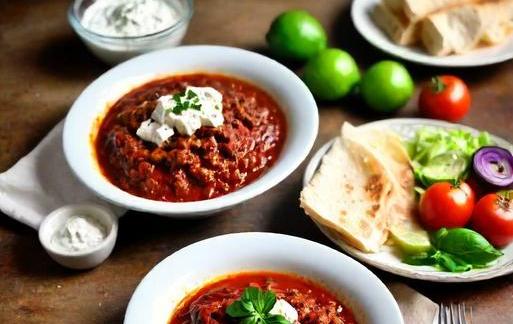- You are here:
- Home »
- Food
- » [REVEALED] Greek Foods That Start With O
[REVEALED] Greek Foods That Start With O
Note: This page contains affiliate links.
As an Amazon Associate, I earn from qualifying purchases when you click on the link, but you are not charged extra.
Greek cuisine is a gastronomic delight that has captivated the taste buds of food enthusiasts worldwide. From savory moussakas to succulent souvlakis, Greek cuisine offers a diverse range of dishes that showcase the rich history and cultural influences of the region. In this culinary exploration, we delve into the lesser-explored realm of Greek foods that start with the letter "O." This often-overlooked category unveils a spectrum of flavors and textures unique to Greece, providing a delightful journey for both the epicurean and the curious. Join us as we unravel the charm of Greek foods beginning with the letter "O."
Contents
- 1 List Of Greek Foods That Start With O
- 1.1 1. Olive Oil (Λάδι)
- 1.2 2. Oregano (Ρίγανη)
- 1.3 3. Octopus Salad (Σαλάτα Με Χταπόδι)
- 1.4 4. Okra Stew (Μπάμιες Κοκκινιστές Με Κρεμμύδια)
- 1.5 5. Ouzo (Ούζο)
- 1.6 6. Orzo Pasta (Κριθαράκι)
- 1.7 7. Oven-Baked Lamb (Ψητό Αρνί)
- 1.8 8. Orange Pie (Πορτοκαλόπιτα)
- 1.9 9. Olive Bread (Ψωμί Με Ελιές)
- 1.10 10. Octopus Souvlaki (Χταποδοσουβλάκι)
- 2 Significance
- 3 Category-Related
- 4 Common Themes
- 5 Interesting Facts
- 6 Conclusion
List Of Greek Foods That Start With O

1. Olive Oil (Λάδι)
Description: While not a dish per se, olive oil (Λάδι) is an essential component of Greek cuisine. Known for its robust flavor and health benefits, Greek olive oil is derived from the Koroneiki olive variety. It serves as the foundation for many Greek dishes, adding depth and richness to salads, dips, and cooked meals.
Usage: Greek olive oil is not only used for cooking but is also drizzled over salads, vegetables, and even desserts. Its distinctive flavor elevates the taste of dishes, making it a quintessential ingredient in Greek kitchens.
2. Oregano (Ρίγανη)
Description: Oregano (Ρίγανη) is a fragrant herb that holds a special place in Greek culinary tradition. Its pungent aroma and slightly bitter taste make it a staple seasoning in various Greek dishes. Whether dried or fresh, oregano adds a Mediterranean touch to salads, grilled meats, and stews.
Usage: Sprinkled generously over feta cheese, incorporated into meat marinades, or infused into olive oil, oregano is a versatile herb that enhances the overall flavor profile of Greek cuisine.
3. Octopus Salad (Σαλάτα Με Χταπόδι)
Description: Greek Octopus Salad (Σαλάτα με Χταπόδι) is a refreshing and vibrant dish that combines tender octopus with fresh vegetables. The octopus is typically boiled until tender, then marinated with olive oil, lemon juice, and herbs. The salad may include ingredients like cherry tomatoes, olives, capers, and red onions.
Preparation: The octopus is boiled until it reaches a perfect tenderness, then sliced into bite-sized pieces. The salad ingredients are combined, and the octopus is delicately folded in. The finishing touch includes a drizzle of extra virgin olive oil and a sprinkle of oregano.
4. Okra Stew (Μπάμιες Κοκκινιστές Με Κρεμμύδια)
Description: Okra Stew (Μπάμιες Κοκκινιστές με Κρεμμύδια) is a hearty and flavorful dish that highlights the unique texture of okra. This stew combines okra with tomatoes, onions, garlic, and aromatic herbs, creating a mouthwatering medley of flavors.
Preparation: Okra is sautéed with onions and garlic until golden brown, then simmered in a rich tomato sauce. The dish is seasoned with a blend of Greek herbs such as thyme and rosemary, resulting in a comforting and satisfying stew.
5. Ouzo (Ούζο)
Description: Ouzo (Ούζο) is an iconic Greek anise-flavored aperitif that holds cultural significance. Distilled from grape skins and flavored with anise, ouzo turns milky white when mixed with water. It is often enjoyed as an aperitif or accompaniment to mezedes (appetizers).
Serving: Ouzo is traditionally served in small glasses over ice. It is common to dilute it with water, which transforms its color and enhances its distinct anise flavor. Accompanying the drink with small bites like olives, feta cheese, or seafood complements the experience.
6. Orzo Pasta (Κριθαράκι)
Description: Orzo Pasta (Κριθαράκι) is a small, rice-shaped pasta that is widely used in Greek cuisine. Its name, derived from the Greek word for barley (κριθή), reflects its shape. Orzo is a versatile ingredient, often featured in soups, salads, and casseroles.
Usage: Orzo is commonly used in traditional Greek dishes such as Yiouvetsi, a baked dish with orzo, tomatoes, and meat. It is also a popular addition to salads, offering a unique texture that pairs well with fresh vegetables and herbs.
7. Oven-Baked Lamb (Ψητό Αρνί)
Description: Oven-Baked Lamb (Ψητό Αρνί) is a classic Greek dish that showcases the succulence of lamb, a meat deeply ingrained in Greek culinary culture. The lamb is marinated with olive oil, garlic, lemon juice, and a blend of herbs before being slow-cooked in the oven to perfection.
Preparation: Marinating the lamb is a crucial step in this dish, allowing the flavors to penetrate the meat. Slow roasting in the oven ensures a tender and flavorful result. The dish is often served with roasted potatoes and a side of tzatziki.
8. Orange Pie (Πορτοκαλόπιτα)
Description: Orange Pie (Πορτοκαλόπιτα) is a delectable dessert that combines the citrusy goodness of oranges with a flaky pastry crust. The filling is a luscious mixture of orange zest, juice, sugar, and eggs, creating a harmonious blend of sweetness and tanginess.
Baking: The pastry crust is typically made with butter or olive oil, providing a rich and crumbly texture. The orange filling is poured into the crust and baked until golden brown. Once cooled, the pie is often dusted with powdered sugar for an extra touch of sweetness.
9. Olive Bread (Ψωμί Με Ελιές)
Description: Olive Bread (Ψωμί με Ελιές) is a rustic and flavorful bread that incorporates the beloved Greek olive into the dough. The olives add a briny and savory element to the bread, making it a perfect accompaniment to meals or a delightful snack on its own.
Baking: The dough is prepared by combining flour, yeast, water, and salt. Chopped or pitted olives are folded into the dough, and the mixture is allowed to rise. The bread is then baked until golden brown, creating a fragrant and irresistible loaf.
10. Octopus Souvlaki (Χταποδοσουβλάκι)
Description: Octopus Souvlaki (Χταποδοσουβλάκι) is a seafood twist on the classic Greek souvlaki. Tenderized and marinated octopus is skewered and grilled to perfection, resulting in a smoky flavor that pairs exceptionally well with the accompanying herbs and lemon.
Grilling: The key to a successful Octopus Souvlaki lies in the preparation of the octopus. Tenderizing and marinating the octopus before skewering ensures a delightful texture and maximum flavor absorption. Grilling over an open flame imparts a smoky char that enhances the overall experience.
Greek cuisine, renowned for its emphasis on fresh and wholesome ingredients, offers a diverse array of dishes that cater to every palate. From the foundational use of olive oil and oregano to the inventive preparation of octopus salad and okra stew, the Greek culinary repertoire is a testament to the country's rich culinary heritage. As we explored the lesser-known world of Greek foods that start with the letter "O", we discovered a symphony of flavors that range from the tangy notes of orange pie to the savory embrace of olive bread. Each dish tells a story, weaving together the threads of tradition, history, and local ingredients. Whether you're savoring the warmth of oven-baked lamb, raising a glass of ouzo in celebration, or indulging in the simplicity of orzo pasta, Greek cuisine beckons with open arms. The culinary journey through Greek foods that start with "O" is not just a gastronomic adventure; it is an exploration of a culture deeply rooted in the joy of sharing meals and creating memories around the table. Greek foods that start with "O" offer a tantalizing glimpse into the vibrant tapestry of Greek gastronomy. As you embark on your culinary odyssey through these delightful dishes, may your taste buds dance with the flavors of the Mediterranean, and may you find inspiration to bring a touch of Greece to your own kitchen. Opa!
Significance

Greek cuisine is renowned for its rich history, diverse flavors, and healthy ingredients. From moussaka to souvlaki, Greek food has captured the hearts and palates of people worldwide. In this culinary exploration, we delve into the lesser-known realm of Greek foods that start with the letter “O”. These dishes not only contribute to the gastronomic tapestry of Greece but also offer a unique and delectable experience for food enthusiasts.
Understanding the significance of Greek foods that start with ‘O’ requires a glimpse into the cultural and historical context of Greece. Greek cuisine is deeply rooted in the country’s history, influenced by a variety of factors, including its geography, climate, and the intermingling of different civilizations over the centuries.
The letter ‘O’ introduces us to a subset of Greek dishes that might not be as widely recognized as their more famous counterparts. Exploring these foods provides an opportunity to appreciate the regional variations, traditional techniques, and the importance of fresh, local ingredients in Greek cooking.
Category-Related

1. Ouzo
Overview:
Ouzo is not just a drink; it’s a cultural institution in Greece. This anise-flavored aperitif is clear but turns milky white when mixed with water. Enjoyed as an aperitif or accompanied by mezedes (appetizers), ouzo is a symbol of conviviality and relaxation in Greek social life.
Preparation:
Distilled from grapes and flavored with anise, ouzo is typically served over ice or diluted with water. It’s a common practice to pair ouzo with small dishes like olives, feta cheese, and seafood.
Regional Variations:
Different regions in Greece may produce ouzo with subtle variations in flavor, owing to the specific types of anise and grapes used. Lesvos, for example, is renowned for its distinct ouzo production.
2. Octopus Salad (Htapodi Salata)
Overview:
A refreshing and flavorful dish, Htapodi Salata showcases the Greek love for seafood. This salad features tender, marinated octopus combined with vibrant vegetables, olive oil, and lemon juice.
Ingredients:
- Octopus
- Tomatoes
- Red Onions
- Cucumbers
- Olive Oil
- Lemon Juice
- Herbs (Oregano, Parsley)
- Olives (optional)
Preparation:
The octopus is typically boiled until tender, then marinated in olive oil, lemon juice, and herbs. It is then combined with diced tomatoes, red onions, and cucumbers to create a refreshing salad.
Serving Style:
Htapodi Salata is often served chilled and makes for a perfect appetizer or a light main course. The combination of citrusy flavors and the unique texture of octopus creates a delightful culinary experience.
3. Okra Stew (Bamies Laderes)
Overview:
Okra, a vegetable with a distinct mucilaginous texture, takes center stage in this hearty and flavorful stew. Bamies Laderes is a comfort food that reflects the simplicity and wholesomeness of Greek home cooking.
Ingredients:
- Okra
- Tomatoes
- Olive Oil
- Onion
- Garlic
- Tomato Paste
- Red Wine Vinegar
- Herbs and Spices (oregano, mint, salt, pepper)
Preparation:
The okra is first sautéed to reduce its sliminess, then cooked with a tomato-based sauce, olive oil, and a blend of aromatic herbs. Red wine vinegar adds a tangy kick to balance the flavors.
Serving Suggestions:
Bamies Laderes is often served with a side of crusty bread or over a bed of rice. The stew’s robust flavors develop even further when allowed to sit, making it a popular leftover dish.
Common Themes
Greek foods that start with ‘O’ share common themes that resonate with the broader principles of Greek cuisine.
1. Emphasis On Fresh And Local Ingredients
Whether it’s the crisp vegetables in the Octopus Salad or the tender okra in Bamies Laderes, Greek cuisine places a premium on using fresh, locally sourced ingredients. The Mediterranean climate provides an abundance of flavorful produce, and Greek cooks celebrate this by showcasing the natural goodness of each component.
2. Balancing Flavors
Greek dishes are known for their well-balanced flavors, and those that start with ‘O’ are no exception. Ouzo, with its anise-infused profile, perfectly balances sweetness and a hint of licorice. Similarly, the Octopus Salad combines the citrusy notes of lemon with the savory richness of octopus, creating a harmonious blend of tastes.
3. Versatility In Preparation Techniques
From the meticulous preparation of ouzo through distillation to the careful marination of octopus in Htapodi Salata, Greek chefs exhibit a diverse range of culinary techniques. The versatility in preparation methods allows for a wide array of textures and flavors, contributing to the richness of Greek cuisine.
Interesting Facts
Unearthing interesting facts about Greek foods that start with ‘O’ adds depth to our appreciation of these culinary delights.
1. Ouzo Rituals
Ouzo isn’t just a drink; it’s a social ritual. In Greece, it’s customary to enjoy ouzo with friends, often accompanied by shared plates of mezedes. The addition of water to ouzo causes a unique chemical reaction called the louche effect, turning the clear liquid into a cloudy, opaque concoction.
2. Octopus As A Staple
Octopus holds a special place in Greek cuisine, and its consumption dates back to ancient times. Greeks have perfected the art of preparing octopus, with methods ranging from grilling to stewing. The Octopus Salad showcases the adaptability of this seafood in contemporary Greek dishes.
3. Okra’s Nutritional Benefits
Bamies Laderes not only delights the taste buds but also offers nutritional benefits. Okra, the star ingredient in this stew, is rich in fiber, vitamins, and antioxidants. It’s a testament to how Greek cuisine seamlessly combines flavor with healthful ingredients.
Conclusion
In the vast and diverse landscape of Greek cuisine, the exploration of foods that start with ‘O’ reveals hidden gems that contribute to the country’s gastronomic tapestry. Ouzo, Octopus Salad, and Okra Stew not only showcase the diversity of flavors but also exemplify the cultural significance of Greek dining.
As we savor the anise-infused warmth of ouzo, appreciate the refreshing medley of flavors in Htapodi Salata, and relish the heartiness of Bamies Laderes, we immerse ourselves in the essence of Greek culinary traditions. These ‘O’-starting dishes invite us to embrace the importance of fresh ingredients, the art of flavor balance, and the joy of shared meals—a true celebration of the Greek way of life. So, the next time you explore Greek cuisine, don’t forget to venture into the realm of ‘O’ and discover the delightful treasures it holds.


